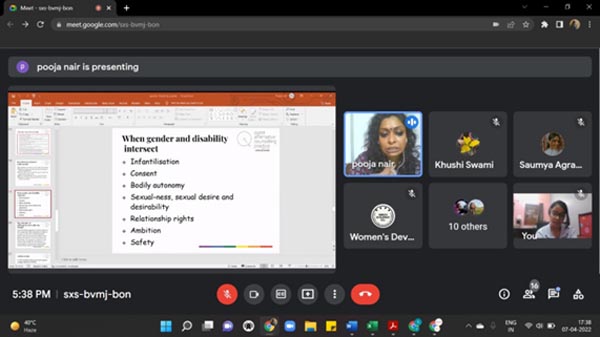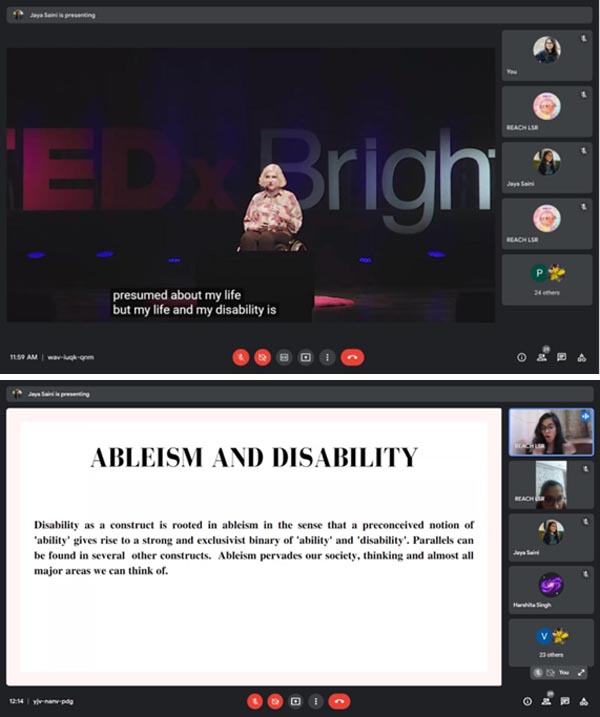REACH, an Acronym for Reaffirming Equity, Access, Capacity and Humanism is an initiative that was created at LSR with support from the Foundation for Academic Excellence and Access (FAEA) in 2002. Through REACH, we strive to preserve and attract diversity on campus by advocating for the rights of students with disabilities to create an accessible and enabling learning environment. We work with students with disabilities as facilitators between the administration and the students to ensure that access needs are met in a time bound manner.
We work closely with the authorities to ensure the proper functioning of the elevators and disabled friendly washrooms, availability of scribes and alternative exam arrangements, access to reading material and so on. In addition to this, we constantly try to enhance infrastructural accessibility on campus for people with diverse access needs. We acknowledge that people with disabilities face structural and attitudinal barriers in addition to physical inaccessibility, hindering their full and equal participation in society and therefore we organize sensitization workshops and academic talks to address the stigma surrounding disability, to keep the discourse on disability going and create a well informed and inclusive student community. Through the initiatives of REACH, LSR has a RESOURCE CENTRE equipped with assistive technology to create access to course material for people with print disabilities, an accessible ATM and elevators and ramps leading to the major academic blocks. This year, we organized a series of disability sensitization workshops with the NSS affiliated NGOs to sensitize kids on appropriate language to refer to people with disabilities, invisible disabilities sign language, etc. We also organized talks on learning disabilities, intersection of disability, gender and sexuality and developmental disabilities in the context of the Indian family.
Furthermore, we regularly organized informal discussions on relevant topics to foster integration and critical reflection among students. To know more about our work and the facilities for students with disabilities in college, feel free to get in touch.
Staff Advisors
Convener: Mahesh S. Panicker
Co-Convener: Kamini Kumari
Society Email Address : reach13.lsr@gmail.com
REACH, The Equal Opportunity Cell of LSR, held its virtual Orientation Session on 27th August, 2021 to familiarize students with the Cell. The session convened with an overview of REACH, its coordinators, and staff adviser and went on to discuss REACH’s functioning, recruitment process, agenda for the year and expectations from volunteers.
REACH conducted collaborative events throughout the year. In collaboration with the Department of Psychology, it organized a session on ‘Neurodivergence’ on 19th January 2022. The talk was conducted by Ms. Amalina Kohli Dave, a mental health activist who works to advocate queer/crip approaches to mental health and has been instrumental in organizing spaces for people with invisible disabilities. On April 18th 2022, a session was organized in collaboration with the Sociology Department on ‘Disability and Capitalism’. The session was begun by Professor Gopa who expressed her happiness over having LSR’s own alumni Dr. Vandana Chaudhry as the guest speaker for the session. Some of the matters focused upon during the session were how disability is inextricably interconnected with ability, the ideology of ability and its interconnection with capitalism. On April 7th 2022, a lecture on the theme ‘Gender, Disability, and the Psyche’ was organized in collaboration with WDC. The speaker of the event was Pooja Nair, an independent therapist.
Important takeaways were the notions of infantilization, patronizing attitudes from society, consent being seen as irrelevant and relationship rights. Further on 8th April REACH in collaboration with the English Literary Association conducted an interactive talk on ‘Literature and Ableism’ by Dr. Hemachandran Karah. Dr. Karah teaches English Literature at the Humanities and Social sciences Department, IIT Madras. His interest lies in researching on disability, health, the language question, literary criticism, and musicology.
REACH, in collaboration with DEBSOC, held a reading session of the book “Laziness Does Not Exist” by Davon Price. The session was part of REACH’s sensitization and awareness series around disability. The book discusses the ableist roots of hustling, productivity, work-dependent self worth in its protest against the “laziness” trop inflicted on those outside the norm of capitalism.
REACH discussed “Em and the Big Hoom” by Jerry Pinto tracing the journey of Pinto as he narrates tales of family, motherhood, psychosis and disability. Collaborating with the student body, the REACH Core team, and other societies, the Literary and Reporting Team produced a newsletter.
The coordinators constantly held informal conversations with the students with disabilities in college to document their experience of the COVID-19 induced online education, and offline transitioning.
Other events/developments included ‘The Outside Gaze: Societal perceptions of Disability’ and sensitization sessions by reaching out to the Debating society, NSS and Enactus.
The “Buddy Group” was opened to all students across college who identified with the experience of disability without diagnostic and documentation requirements. While all administrative procedures that have to be separately followed for PWD students in college were followed, the Buddies group also went beyond to become a wider interaction. REACH introduced an “Opportunity Desk” or a common information bulletin for all opportunities, sessions, events and lectures that are relevant to the context of disability and REACH. Accessibility issues were taken up including infrastructural difficulties faced, the navigation of hostel facilities, the requirement of scribes and the technical glitches with respect to Open Book examination and result declaration. The Resource Team completed two departments’ drives [History and Political Science] to ensure availability of accessible study material. Through Social Media, REACH introduced an engaging concept of “Disability Dictionary” where the cell members broke down meanings of many terms and redefined them through the disability justice paradigm. They used the platform to create a LinkedIn account for REACH and created a logo for 2021-22.
